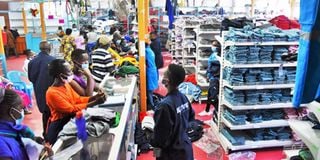Costly scholarly materials negate education goals

Attendants serve parents and their children at Patmat bookshop and uniforms stores in Nakuru town on December 28, 2020, ahead of the reopening of schools on January 4, 2021.
There have been numerous cases of schools demanding that parents buy exaggerated assorted items from specific outlets.
Prevalent cases are on school uniforms, books and other attendant learning materials, utensils and list is endless and continually reviewed upwards. Other schools have resulted into stocking the essentials in their schools and demand money to foot bills for these items.
This is a mockery of one of the foundational aims of education in the country that seeks to promote social equity and foster patriotism and national unity. So costly have these uncalled-for trends become that some parents and guardians opt for schools that are not the learners’ choices and at times away from home.
This is increasingly creating a spiral negative effect onto the entire spectrum of, particularly, basic education level. The agony of many who can barely afford basic needs has been compounded. Quacks sell pirated books and revision guidelines and possibly counterfeit school materials, which leaves the genuine authors and manufacturers with zero returns on investment.
Lower than market price
One would expect that where schools establish such a business relationship, the cost of the items must be lower than the market price due to economies of scale and sustained business for them. But the stark opposite is what obtains.
These bottlenecks may also befall actualisation of the Kenya Institute of Curriculum Development’s Parental Empowerment and Engagement (PE&E), a framework that seeks parents’ active role and participation in the larger enabling environment for learners’ holistic development.
Standardisation of prices by the Ministry of Education by creating a price index of most common school items with such database accessible to all may be a starting point to curb this menace. The cost of education must be calibrated to promote the ‘Education for All’ principle.





